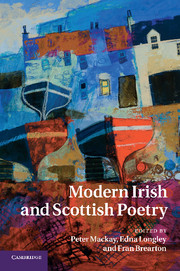Book contents
- Frontmatter
- Contents
- List of contributors
- Acknowledgements
- Introduction
- 1 Swordsmen: W. B. Yeats and Hugh MacDiarmid
- 2 Tradition and the individual editor: Professor Grierson, modernism and national poetics
- 3 Louis MacNeice among the islands
- 4 Townland, desert, cave: Irish and Scottish Second World War poetry
- 5 Affinities in time and space: reading the Gaelic poetry of Ireland and Scotland
- 6 Contemporary affinities
- 7 The Classics in modern Scottish and Irish poetry
- 8 Translating Beowulf: Edwin Morgan and Seamus Heaney
- 9 Reading in the gutters
- 10 ‘What matters is the yeast’: ‘foreignising’ Gaelic poetry
- 11 Outside English: Irish and Scottish poets in the East
- 12 Names for nameless things: the poetics of place names
- 13 Desire lines: mapping the city in contemporary Belfast and Glasgow poetry
- 14 ‘The ugly burds without wings’?: reactions to tradition since the 1960s
- 15 ‘And cannot say / and cannot say’: Richard Price, Randolph Healy and the dialogue of the deaf
- 16 On ‘The Friendship of Young Poets’: Douglas Dunn, Michael Longley and Derek Mahon
- 17 ‘No misprints in this work’: the poetic ‘translations’ of Medbh McGuckian and Frank Kuppner
- 18 Phoenix or dead crow? Irish and Scottish poetry magazines, 1945–2000
- 19 Outwith the Pale: Irish–Scottish studies as an act of translation
- Guide to further reading
- Index
- References
15 - ‘And cannot say / and cannot say’: Richard Price, Randolph Healy and the dialogue of the deaf
Published online by Cambridge University Press: 18 April 2011
- Frontmatter
- Contents
- List of contributors
- Acknowledgements
- Introduction
- 1 Swordsmen: W. B. Yeats and Hugh MacDiarmid
- 2 Tradition and the individual editor: Professor Grierson, modernism and national poetics
- 3 Louis MacNeice among the islands
- 4 Townland, desert, cave: Irish and Scottish Second World War poetry
- 5 Affinities in time and space: reading the Gaelic poetry of Ireland and Scotland
- 6 Contemporary affinities
- 7 The Classics in modern Scottish and Irish poetry
- 8 Translating Beowulf: Edwin Morgan and Seamus Heaney
- 9 Reading in the gutters
- 10 ‘What matters is the yeast’: ‘foreignising’ Gaelic poetry
- 11 Outside English: Irish and Scottish poets in the East
- 12 Names for nameless things: the poetics of place names
- 13 Desire lines: mapping the city in contemporary Belfast and Glasgow poetry
- 14 ‘The ugly burds without wings’?: reactions to tradition since the 1960s
- 15 ‘And cannot say / and cannot say’: Richard Price, Randolph Healy and the dialogue of the deaf
- 16 On ‘The Friendship of Young Poets’: Douglas Dunn, Michael Longley and Derek Mahon
- 17 ‘No misprints in this work’: the poetic ‘translations’ of Medbh McGuckian and Frank Kuppner
- 18 Phoenix or dead crow? Irish and Scottish poetry magazines, 1945–2000
- 19 Outwith the Pale: Irish–Scottish studies as an act of translation
- Guide to further reading
- Index
- References
Summary
Contemporary poetry has reserved a special welcome for the extraterrestrial perspective since Craig Raine's A Martian Sends a Postcard Home (1979), and a passing Martian who turned up at a Six Nations rugby game, if such a thing can be imagined, might find itself puzzled by the use among commentators of the phrase ‘Celtic nations’. The presence of France and Italy complicates things slightly, but what does the label mean, the Martian might reasonably ask, apart from ‘not England’? The two poets I wish to consider, Randolph Healy and Richard Price, occupy a territory somewhere between ‘the Celtic nations’ and ‘not England’, without my being able to locate where exactly they do belong; and this is both a classificatory problem and a symptom of what makes their work as distinctive and absorbing as it is. It is almost a century since T. S. Eliot wondered ‘Was There a Scottish Literature?’, before gingerly deciding that no, there were only British writers who happened to live north of the border. It might be almost as heretical as Eliot appears to us, now, to wonder if there is such a thing as a non-Irish or non-Scottish writer anymore, one who originates in Ireland or Scotland but whose writing defiantly has nothing to do with those countries and the discourse of the nation that still surrounds so much academic writing on poetry.
- Type
- Chapter
- Information
- Modern Irish and Scottish Poetry , pp. 251 - 264Publisher: Cambridge University PressPrint publication year: 2011



